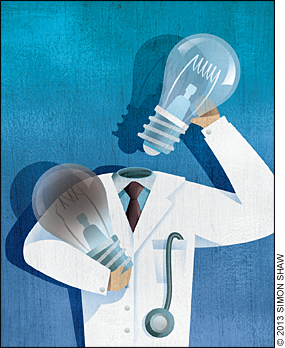 Thomas Murphy, rheumatologist, recently published a book about physician burnout: “Physician Burnout: A Guide to Recognition and Recovery”; he also has a website dedicated to this issue. Here we present the article “Physician Burnout: A Personal Story”, published on Medscape, which aims to be the first in a series about physician burnout in which dr Murphy and Medscape seek to bring knowledge and awareness to this topic.
Thomas Murphy, rheumatologist, recently published a book about physician burnout: “Physician Burnout: A Guide to Recognition and Recovery”; he also has a website dedicated to this issue. Here we present the article “Physician Burnout: A Personal Story”, published on Medscape, which aims to be the first in a series about physician burnout in which dr Murphy and Medscape seek to bring knowledge and awareness to this topic.
Burnout has been defined as “an erosion of the human soul”. Murphy wanted to explore this phenomenon starting from himself, from the life experiences that made him aware he was impatient, sarcastic, and occasionally dismissive of his patients: in short, he was not happy.
As he learned about the problem of physician burnout, he came to recognize he was not alone. He learned that burnout is not some psychological abnormality too embarrassing to speak about in public, quite the contrary: a 2011 survey of over 2000 US physicians found that 87% reported feeling moderately to severely stressed or burned out on an average day.
But how a physician can identify a burnout situation? Murphy highlights mainly three symptoms: emotional exhaustion, depersonalization, and lack of personal accomplishment. An obvious change in demeanor or character, or overreactions to seemingly minor provocations resulting in an outburst of temper or crying, changes in sleep habits or appetite, may be a sign of burnout too.
Burnout is insidious, a creeping tide that slowly overwhelms a physician’s life. It often starts as early as medical school, an environment with a culture of self-reliance and independence. Physician self-image frequently prevent from showing signs of weakness or suffering. For such reasons, even Murphy refused to accept burnout symptoms.
Burnout affects not only physicians, but also their families, relationships, colleagues, and – of course – patients. According to Murphy, patients suffer because a disabled doctor cannot deliver the type of care they deserve, and they need to believe in doctor: an empathetic touch can make all the difference and be the key to medical success.
In Italy and other countries there is a lot of scientific literature on the burnout syndrome; however, in hospitals and other healthcare institutions there is a huge lack of professional roles who provides care to the providers affected by the burnout syndrome. Physicians and nurses are left alone, completely abandoned to take care individually of themselves after the prolonged exposure to suffering of patients. An institutional health system to cure burnout is to forward, and it should be integrated in the quality system for healthcare delivery.

Nice Information
Burn out syndrome is excessive and chronic stress caused by overload or excessive work. The term “burnout” is an English word and literally means “burn to the end”. It is, therefore, physical and mental exhaustion resulting from an exhausting and overloaded professional life.
learn More about Burnout Syndrome …